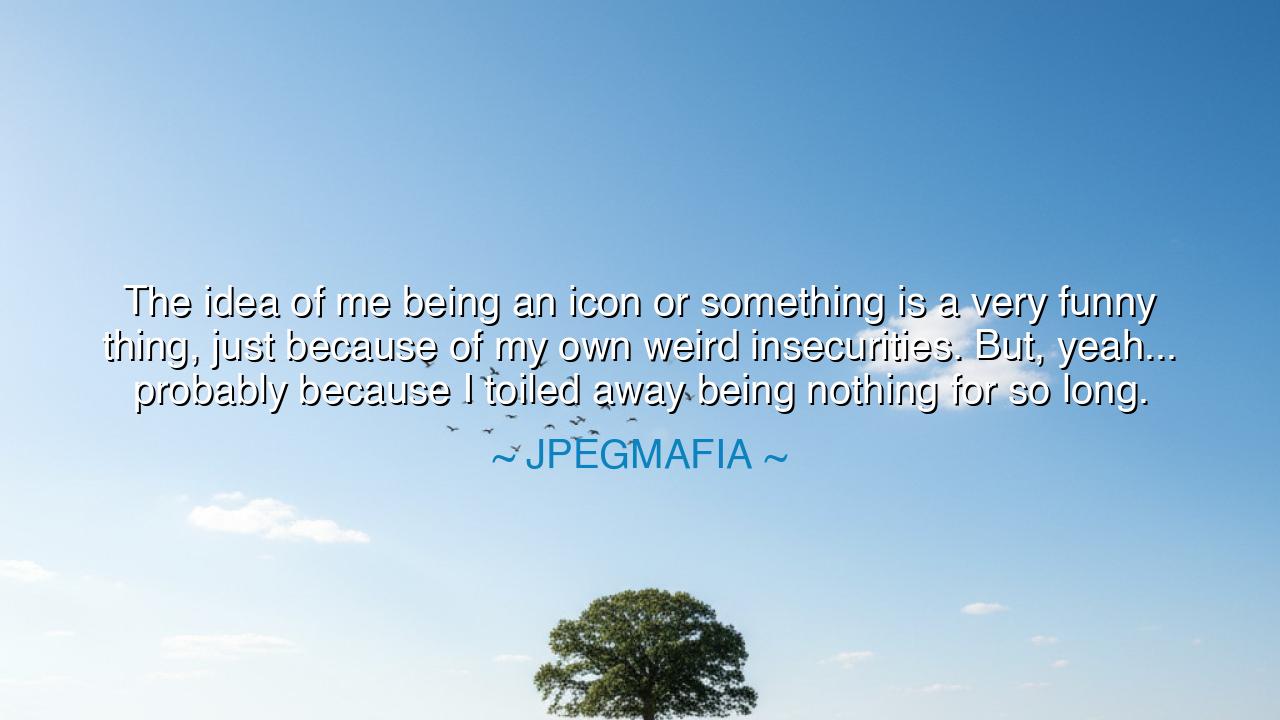
The idea of me being an icon or something is a very funny thing
The idea of me being an icon or something is a very funny thing, just because of my own weird insecurities. But, yeah... probably because I toiled away being nothing for so long.






When JPEGMAFIA said, “The idea of me being an icon or something is a very funny thing, just because of my own weird insecurities. But, yeah… probably because I toiled away being nothing for so long,” he spoke with the honesty of a man who has walked through the wilderness of obscurity and returned with the humility of understanding. His words strike a chord that echoes through the ages — the truth that greatness is rarely recognized by those who have suffered to achieve it, and that the longer one has lived unseen, the harder it is to believe that one’s light now reaches others. Beneath his humor lies a quiet ache — the ache of a soul that remembers when no one listened, and thus finds irony in the sound of applause.
The origin of this reflection lies in JPEGMAFIA’s own journey, marked by hardship, isolation, and fierce self-discipline. Before the world celebrated him as a visionary of experimental sound and raw emotion, he was a man struggling in the shadows, crafting his art in defiance of invisibility. Years of rejection, poverty, and doubt hardened him, but they also honed him. And now, when the world calls him an icon, he cannot help but laugh — for he remembers too vividly the nights when he was “nothing.” His laughter is not arrogance but disbelief; his humility, not false modesty, but the honest bewilderment of a man who knows that fame is as strange as it is fragile.
The ancients knew this paradox well. The philosopher Socrates, who was deemed the wisest of men, claimed to know nothing — not because he lacked knowledge, but because he recognized the vastness of ignorance that lies beneath understanding. So too does JPEGMAFIA’s humility spring from wisdom. He laughs at the idea of being an “icon” because he sees through the illusion of titles, knowing that behind the myth of success lies a human heart, still trembling with insecurities and memories of struggle. This is the mark of the true sage: to see one’s greatness and yet to feel small before the immensity of what one has endured.
There is also in his words a lesson on identity and authenticity. The world, in its hunger for idols, loves to crown the artist as a symbol, to strip them of their humanity and cast them into legend. But JPEGMAFIA resists this transformation. He knows that to be called an icon is to risk becoming a statue — frozen, distant, lifeless. His humor becomes his shield, protecting his soul from the coldness of worship. For laughter, in this sense, is rebellion — a refusal to let the world’s praise turn him into something unreal. His laughter says: “I am still me — still flawed, still learning, still alive.”
History offers us a reflection of this truth in the life of Vincent van Gogh, who toiled in poverty and obscurity, believing himself a failure. Only after his death did the world hail him as a genius, as an icon of artistic suffering. One wonders what he would have thought of such reverence. Like JPEGMAFIA, he might have found it “funny” — for to the one who has lived unseen, recognition feels like a trick of fate, an irony too strange to bear without a smile. Both men share the same revelation: that the journey toward self-worth is often longer than the journey toward fame, and that even when the world applauds, the soul still whispers, “Remember when no one cared?”
There is also a deeper, almost spiritual dimension to JPEGMAFIA’s words. He reminds us that toil — the labor of creation, of persistence through nothingness — is sacred. In the ancient world, the blacksmith, the monk, the poet, all knew that transformation begins in solitude. To “toil away being nothing” is not shameful; it is initiation. It is the forge in which resilience is tempered and authenticity born. When he calls himself “nothing,” he speaks the language of the mystics, who know that greatness can only arise from humility, that the self must be broken before it can be made whole.
So, dear listener, let this be your lesson: do not fear obscurity, nor mock your struggles. The years when no one sees you are not wasted — they are the furnace of your becoming. When success finally comes, meet it not with pride but with humor, as JPEGMAFIA does. Laugh at your titles; remember your beginnings. Keep your insecurities as reminders that you are human, not an idol. For the world may call you “icon,” but you must remain a worker, still toiling in the service of truth.
Thus, JPEGMAFIA’s words stand as both confession and commandment: that humility is the soul’s armor against illusion, and that laughter is the language of those who have endured. To the one who has known nothingness, fame is not a crown but a mirror — reflecting not glory, but the long, lonely path that led there. And in that reflection lies the truest wisdom of all: that greatness is not about being seen, but about never forgetting the unseen struggle that made you.






AAdministratorAdministrator
Welcome, honored guests. Please leave a comment, we will respond soon